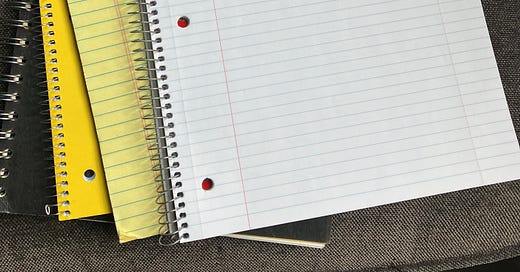Hello & happy Friday! A quick reminder about subscriptions: every month paid subscribers get writing prompts, readings, and a bonus newsletter, which is what appears below. If you want to read the rest, subscribe! If not, you’ll see my free newsletter next week. Thanks, as always, for reading.
In a few weeks I’m heading out to a one week residency at Weymouth Center for the Arts & Humanities in Southern Pines, NC. I will spend my time there working on my novel, specifically rewriting Act II from scratch, by hand. Hopefully you didn’t do a spit-take there.
I learned of this rewrite strategy from a graduate school friend who’d gone to a reading by Lauren Groff. When asked about her process, Groff said that she writes through a full first draft of a book and when she’s done, she sets all of that aside and starts again. Rewrites, from scratch, on the blank page, the whole book, from beginning to end.
When I first heard this, I was appalled—why make writing even harder than it already is? Let me be clear: I am not against writing by hand. I often write first drafts by hand because it’s the best route to my subconscious, to access my most intuitive and reliable story ideas, and because it’s just so darn fun, reminding me of being a kid and making up stories to keep myself entertained. But rewriting by hand, words I’d already written once by hand and then typed up—I vowed never to undertake something so outlandish. Until now.
I’ve already written some of Act II, which sits in jagged sections on my laptop, sections that don’t yet connect or build to something bigger. The middle of a book is notoriously difficult to write. I would skip it and write the end except, gulp, I have no idea how this book ends. By far my best option now is to retell what I know of the middle part of the book on the fresh, blank page and trust that telling myself the parts of the story I do know will eventually reveal the parts still in the dark.
So that’s the rough plan: write out the events I’m sure are in Act II (well, sure right now) and then try to write scenes that connect them. I draft connecting scenes by trying to answer a question—what event might trigger this character to go from emotional state A to emotional state B? Or if this character does X, how will that character respond? I keep pushing characters toward conflict and interrogating their motivations. Usually through this process I can slowly uncover the story. But if I get super stuck, I insert an arbitrary dramatic moment like a power outage or heat wave, something that will force my characters to act and react. Put your characters under pressure and they will tell you the story.
If this all sounds a little unformed to you, more like a leap of faith rather than a reliable plan, well, that’s because it is. I do 90% of my writing on intuition, making narrative choices based on a gut sense of what works and what doesn’t. This requires a deep honesty—writing by intuition requires listening hard for that little hitch in your gut, that discomfort that signals what you’ve written isn’t quite right and needs to be changed. Sometimes the needed change is clear. If not, I just keep putting pen to the page, keep trying to push the story forward, until the answer appears.
Writing isn’t formulaic. It is important to learn the craft, to study character development, structure, and the rest, but it’s just as important to embrace that making art is a process that includes mystery and magic, as it should. If I knew where I was going and exactly how I was going to get there, well, what would be the fun of that?
I’ve learned over the years the story is inside us. We can churn out draft after draft and hold tight to those pages, backing them up in a zillion places, but the truth is, the story is inside us. We know it by heart. We just need to give our heart a little space to get it out. I always sympathize with students who have lost drafts, pages, versions they can’t seem to conjure from the tech ether. But I also tell them it’s for the best, that they will rewrite it better and faster. Despite their protestations, this always turns out to be true.
How can it be faster to rewrite the dang thing I already wrote? I can’t explain that. I don’t have the mathematical proof. I just know it’s true: the first step to rebuilding is erasure. Without all those existing words getting in my way, the story comes out clear and pure, like water from a cold mountain stream.





